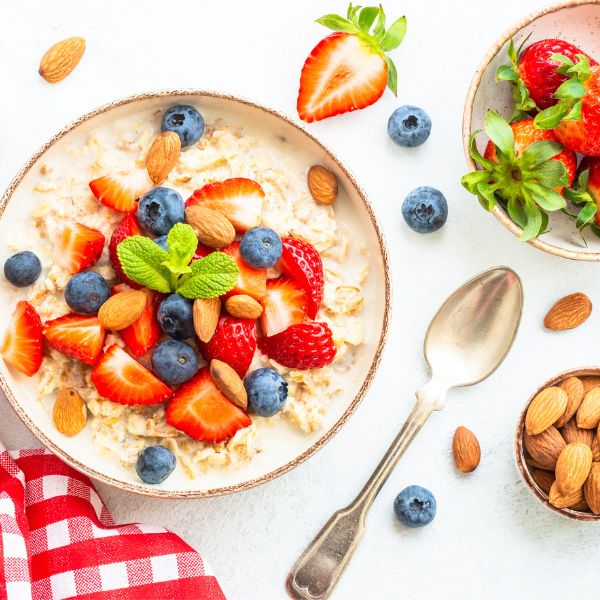 Breakfast is often called the most important meal of the day. While this belief may stem from marketing, what you consume in the morning does get your metabolism going, helps you start burning calories and energizes your body.
Breakfast is often called the most important meal of the day. While this belief may stem from marketing, what you consume in the morning does get your metabolism going, helps you start burning calories and energizes your body.
Eating breakfast also helps reduce weight gain and lowers the risk for type 2 diabetes, stroke and heart disease. You’ll also find that you focus better and your body is less likely to hold onto calories.
Yet not all breakfast foods are equal. Fiber and protein give you more mileage and help you feel full compared to a meal with refined carbohydrates and sugars. To build a better breakfast, think about the following factors.
Planning Your Breakfast
The components of a healthy breakfast start with a high-fiber food like oatmeal or whole grains, plus a protein like eggs, lean meat or yogurt and some variety of fruits, vegetables or nuts.
Some experts recommend centering the meal around three separate food groups for sufficient sources of fiber, fat and protein and adding other vitamins and minerals that kickstart your metabolism, keep you full longer and help you burn calories. You’re also advised to base the meal on whole foods – select grains, eggs, fruits and vegetables – versus processed ingredients or pre-packaged meals.
For some suggestions:
- Include a source of fiber. This could be whole grain bread, oatmeal or cereal low in sugar and high in fiber. Any vegetables you add further increase your fiber intake.
- Add a protein. Eggs are standard for their high protein content and low cost, yet they are not your only option. Based on the meal you’re planning, think about adding peanut butter, milk, cottage cheese, ricotta, Greek yogurt or nuts.
- See how you can repurpose leftovers. Last night’s veggies could be scrambled with eggs and cheese, plus some whole grain toast on the side.
- Keep it simple. Especially during the work week, you’re less likely to eat a healthy breakfast if it involves intensive cooking, which is why many people reach for a bowl of cereal or a pastry. Keep basic staples around to fulfill these recommendations, like whole grain bread, bananas, peanut butter and yogurt, or prepare your meal ahead of time.
- Don’t limit yourself. To make breakfast more enjoyable, branch out to unique spices, vegetables and cheeses or explore less-common grains.
- Think about nutrients. Adding fruits and vegetables can supply your body with vitamins, minerals and antioxidants that fight free radicals and help your body manage inflammation. For these benefits, consider adding blueberries, kale or a cup of green tea.
- Limit sugar intake. Sugars increase the calorie content of your breakfast without adding nutritional value, increase your risks for weight gain, contribute to blood sugar spikes and can interfere with concentration. As such, limit how often you have a high-carb, sugary breakfast and be selective with how you sweeten your foods.
- Coffee: This beverage can lower your risks for cardiovascular disease, liver disease and diabetes, as well as provide a source of antioxidants. However, you only get these benefits when you limit sugar and cream.
- Control your portion size. We tend to eat smaller meals for breakfast and end the day with a larger dinner. However, some people advise the reverse order – starting the day with breakfast as your largest meal and ending with a smaller dinner. Especially with a breakfast high in protein and fiber, your glucose is less likely to spike and you’ll feel fuller until lunch.
- Don’t just make smoothies. While smoothies can deliver more vitamins, nutrients and fiber compared to juice, the smooth consistency means the rest of your digestive system doesn’t have to work as hard to process food. As such, you may feel hungry after a couple hours.
Meal Suggestions
Considering these points for making a healthier breakfast, try out the following meals:
- Eggs with whole grain toast and vegetables
- Oatmeal with some nuts, bananas and milk
- A cottage cheese or Greek yogurt parfait with granola and berries
- Combining leftovers with eggs
Whatever your preference is for a healthier breakfast, explore your options at Colony Diner to get your grains and fiber. Browse our menu before stopping in for a meal or placing an order for takeout.






